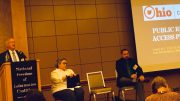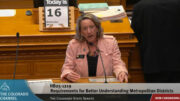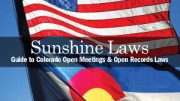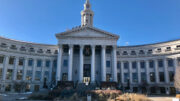By Sandra Fish
CFOIC Contributor
And some groups said they may ask voters to approve constitutional changes to guarantee government transparency.

“Colorado Freedom of Information Coalition and other groups are looking at both legislative and initiative options, including an initiated constitutional amendment, to protect the public’s right to know,” said Jeff Roberts, executive director of CFOIC, told the Executive Committee of the Legislative Council.
Monday’s objections ranged from closed legislative party caucus meetings to retention of legislative emails and text messages. Some also asked legislative leaders to begin livestreaming video of legislative committee meetings.
Lawmakers effectively exempted themselves from portions of the state’s open meetings law earlier this year. The bill passed and was signed by Democratic Gov. Jared Polis in March during Sunshine Week, an annual national celebration of open records and open meetings laws.
In August, House and Senate Democrats excluded reporters and the public from caucus meetings preceding a special session on property taxes.
“How could legislative meetings on a topic as important to the public as property taxes not fit the definition of public business?” Roberts asked.
Representatives of the League of Women Voters of Colorado, the Independence Institute and several individuals also asked that Senate Bill 24-157 be repealed. Andrea Wilkins, legislative liaison for the league, said the group “supports efficient and effective government, but we do not support expediency at the expense of transparency.”
The league and the Independence Institute, a free-market think tank, are among the organizations considering asking voters to enshrine open meetings and open records in the state constitution.
House Speaker Julie McCluskie, D-Dillon, said she wasn’t aware of efforts to amend the constitution until Monday.
“When we brought the legislation forward this year, it was in an attempt to modernize an open meetings law that had not initially contemplated emails and cell phones, text messages,” McCluskie said at the start of the meeting.
She said she would be open to changes in the law and encouraged people to contact her with suggestions.
Tim Regan-Porter, CEO of the Colorado Press Association, noted that the Colorado Open Records Act doesn’t have retention requirements for government communications such as email or text messages.
“It really does concern me that the public is going to view this as their legislators and their government trying to hide things from them,” Regan-Porter said.
Bart Miller, a former legislative lawyer who serves on the board of the Colorado Channel Authority, asked the legislative leaders to video livestream committee meetings. Only House and Senate floor sessions are broadcast live, and Maine is the only other state that doesn’t livestream video from legislative committee hearings. Miller said the authority board has written the leadership committee several times and never received a response.
Senate Republican Leader Paul Lundeen of Monument questioned how much staff livestreaming would require, an expense paid by the legislature. Miller said he couldn’t get an estimate without lawmakers asking legislative staff for one.
The six-member executive committee held the public hearing on the last day possible under the law, during a time when many Coloradans are vacationing or celebrating the holidays with family. Outgoing Senate President Steve Fenberg, D-Boulder, and House Republican Leader Rose Pugliese of Colorado Springs were absent.
The legislature approved the Colorado Open Records Act in 1968, while Colorado voters approved the open meetings law in 1972. Placing such laws in the state constitution would prevent the legislature from changing them without approval of voters.
Sandra Fish recently retired as a data journalist and politics reporter for The Colorado Sun.
Follow the Colorado Freedom of Information Coalition on X (formerly Twitter) @CoFOIC. Like CFOIC’s Facebook page. Do you appreciate the information and resources provided by CFOIC? Please consider making a tax-deductible donation.




